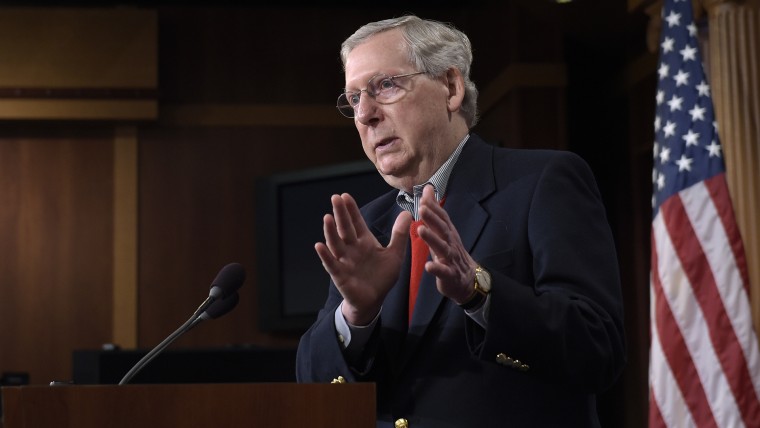About a month ago, Donald Trump endorsed a bipartisan criminal justice reform bill and encouraged the Senate to advance the legislation during the lame-duck session. And then ... nothing happened.
Sen. Tom Cotton (R-Ark.), one of the leading opponents of the measure, continued to lobby aggressively against it, and Senate Majority Leader Mitch McConnell (R-Ky.) generally ignored political pressure and said there wasn't time to take up the legislation. By all appearances, that wasn't altogether true, and proponents of the bill kept trying to nudge the GOP leader into allowing a vote.
As of this morning, those efforts apparently paid off.
In a surprising move Tuesday, Senate Majority Leader Mitch McConnell announced that he plans to bring a criminal justice reform bill to the Senate floor this month for a vote.The Kentucky Republican made the announcement in remarks on the Senate floor, saying, "[A]t the request of the president and following improvements to the legislation that have been secured by several members, the Senate will take up the recently revised criminal justice bill this month. I intend to turn to the new text as early as the end of this week."
At issue is a measure known as the First Step Act, which is a pretty good reform proposal that easily passed the House in May. The bill is fairly modest in scope -- Vox explained that it would affect only about a tenth of the nation's prison population, targeting federal facilities exclusively -- but it includes provisions that would expand eligibility in the Fair Sentencing Act, ease mandatory-minimum sentences, and increase "credit" programs that would enable some federal inmates to earn early release.
Why would Donald "tough on crime" Trump endorse such a package? It's hard to say for sure, but my best guess is that the president has no idea what's in the bill, but he likes the idea of signing bipartisan legislation on an important national issue.
Because after nearly two years in office, Trump hasn't had many opportunities like these.
It's worth emphasizing that the exact language of the Senate bill hasn't been released to the public yet. McConnell this morning mentioned some "improvements" to the legislation -- apparently made to garner greater Republican support -- and we don't yet know what those changes include or whether it'll affect Democratic backing.
What's more, the fact that there have been any changes at all means that the bill, if it passes the Senate, would have to return to the House before it could advance.
And that's where some logistical challenges kick in: the House will have an abbreviated calendar next week, and the chamber will be out for the holidays the week after. At some point before Dec. 21 -- a week from Friday -- Congress is also going to have pass some spending bills to prevent a government shutdown, too.
All of which is to say, the First Step Act isn't yet a sure thing.
But McConnell's unexpected shift in posture at least opens the door that appeared closed. There are still GOP divisions over the bill, and it'll need 60 votes to advance.
My best guess is that those votes will be there.
